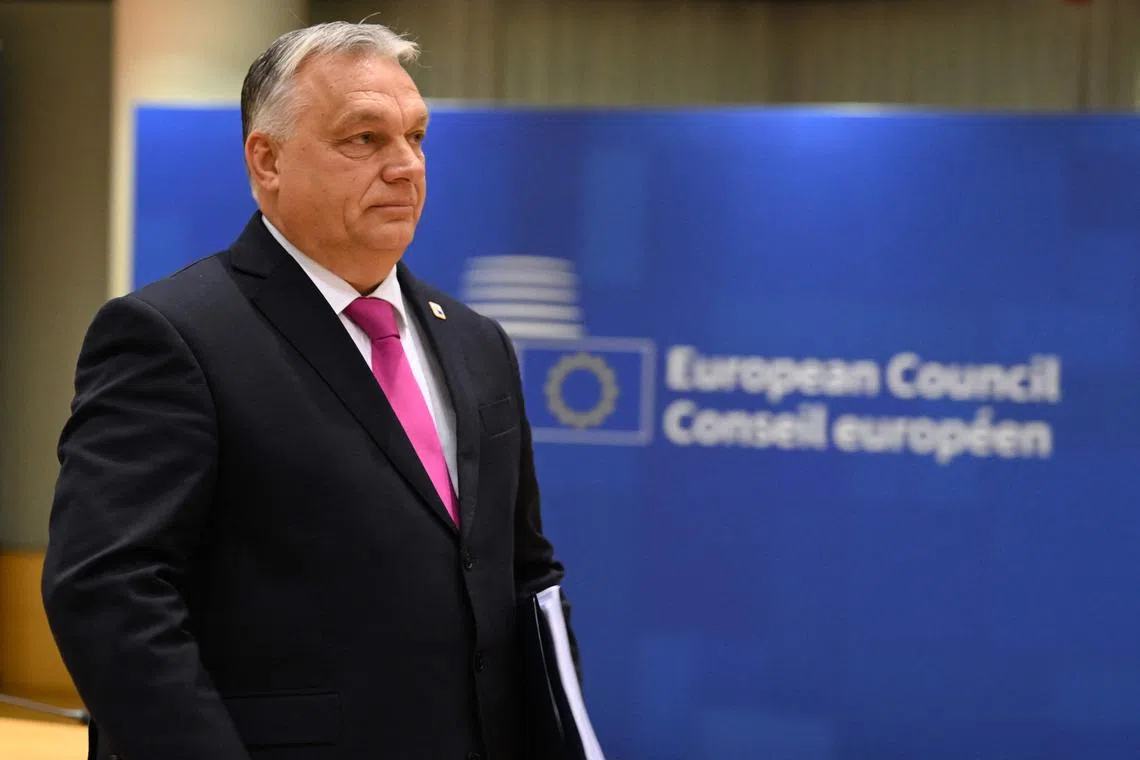EU leaders vow to overcome block by Hungary’s Orban on Ukraine aid
Sign up now: Get ST's newsletters delivered to your inbox

European Commission president Ursula von der Leyen at a news conference, following a summit of European Union leaders in Brussels.
PHOTO: BLOOMBERG
Follow topic:
BRUSSELS – European Union leaders on Dec 15 pledged to find a way around Hungary’s veto on a €50 billion (S$72.6 billion) aid package for Ukraine, after Prime Minister Viktor Orban blocked the desperately needed support.
The 27 leaders will reconvene for an emergency summit early in 2024 to try to hammer out a deal after intense wrangling at a two-day meeting in Brussels failed to budge Mr Orban.
The failure to commit more aid to prop up Ukraine’s budget over the next four years dealt a blow to Kyiv, even after the EU took the symbolic step of agreeing to open membership talks.
“We expect all the necessary legal procedures to be completed in January 2024, which will allow us to receive the relevant funding as soon as possible,” the Ukrainian Foreign Ministry said in a statement.
German Chancellor Olaf Scholz said he was “reasonably optimistic” that an agreement could be reached with Mr Orban at the next summit.
European Commission chief Ursula von der Leyen vowed that her executive body would use the time to ensure there is an “operational solution” to Mr Orban’s veto, “whatever happens”.
That could mean the other 26 EU countries that back giving the aid to Kyiv could club together without Hungary to come up with the aid outside the bloc’s budget.
“We are working very hard, of course, to have a result where there is an agreement of 27 member states,” Dr von der Leyen said. “But I think it is now also necessary to work on potential alternatives.”
Irish Prime Minister Leo Varadkar said that “it looks like we’ll just have to regroup next year, and come to an agreement then, or do a workaround”.
Mr Orban, in an interview with Hungarian state radio, linked the planned EU money for Ukraine to tens of billions of euros that Brussels has frozen for Hungary because of democratic backsliding and corruption concerns.
“This is a great opportunity for Hungary to make it clear that it should get what it deserves,” Mr Orban said. “We want to be treated fairly, and now there is a good chance that we can assert this.”
Kremlin praises Orban
The hold-up from Mr Orban – Russia’s closest ally in the EU – comes as Ukraine is desperately seeking to change the narrative that Western backing is waning nearly two years into Moscow’s invasion.
Russia praised Hungary for blocking the aid, with Kremlin spokesman Dmitry Peskov saying that Budapest, “in contrast to many European countries, firmly defends its interests, which impresses us”.

Hungarian Prime Minister Viktor Orban is Russia’s closest ally in the European Union.
PHOTO: AFP
But Moscow was far more critical of the decision by the EU to open accession talks with Ukraine and fellow former Soviet state Moldova, and make Georgia a formal candidate to join.
“This is absolutely a politicised decision – the EU’s desire to show support to these countries in this way. But certainly, such new members can actually destabilise the EU,” Mr Peskov said.
“Everything is being done to annoy Russia and antagonise these countries towards Russia.”
The approval of the membership talks came after Mr Orban – who had threatened to stop them – took the highly unusual step of leaving the negotiating room to let the other EU leaders vote it through.
Mr Orban’s absence for the issue raised alarm bells for some EU leaders, worried that such tactics could be replicated for other thorny decisions, weakening bloc unity.
“I think a negative precedent is being set,” said Cypriot President Nikos Christodoulides.
‘Very far’
But Ukraine’s President Volodymyr Zelensky, who did not attend the knife-edge summit, called the membership-talks decision “a victory that motivates, inspires and strengthens”.
The White House – which faces opposition from US Republicans on supporting Ukraine – hailed the “historic decision”.
Despite the euphoric rhetoric, the agreement to open membership negotiations with Kyiv does not mean that Ukraine will be joining the EU any time soon.
“We are very far from effective enlargement to Ukraine,” said French President Emmanuel Macron.
Before the talks can be launched, EU states must agree on a negotiating framework – giving Mr Orban ample opportunity to stall the process again.
“Now the reality will come,” warned Slovakia’s Prime Minister Robert Fico, a populist and Orban ally.
“If the European Union feels that Ukraine is not ready, it will be able to slow down this process, or it will be able to stop it altogether.” AFP

